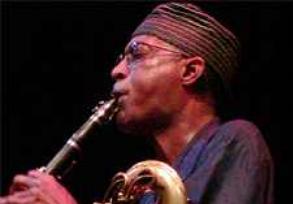








JACOB H. CARRUTHERS FOR INNER CITY STUDIES
Mwata Bowden
Born October 11, 1947 in Memphis, Tennessee, Mwata Bowden came the South Side of Chicago with his family when he was ten. Following the path that generations of African-Americans had taken since the beginning of the century, Bowden's father came North looking f or better-paying work and found it at a South Side factory.
More than just a place to make a living, though, the South Side in the 50's was teeming with jazz, its exuberant, life-affirming sounds making a profound impression on Bowden, the eldest of the family's seven children.
"The community was really vibrant then," recalls Bowden. "Along 47th Street, you had the Regal Theater, the Metropolitan Theater, clubs, bars, cabarets, everything. It was a thriving area, and we lived a block away, at 46th and Vincennes".
"And musicians were visible all over the neighborhood. I would see these guys walking around with their beautiful instrument cases in their hands, I would walk by Gerri's Palm Tavern and hear the music pouring out onto the street from inside. And when I heard that, I thought, 'Man, I want to play that music.'"
Having picked up 'one of those old, metal, silver clarinets' in church when he was twelve, Bowden soon found himself in the junior high school band and, a couple of years later, playing at DuSable High School for one of the most revered figures in Chicago Black Music, Captain Walter Dyett. This was the man who had inspired and trained no less than Nat 'King' Cole, Johnny Griffin, Gene Ammons, Von Freeman, Richard Davis, Fred Hopkins, and other South Side music giants too numerous to mention.
"Playing in the school bands for Capt. Dyett was about much more than just music, though maybe I didn't realize it at the time. Capt. Dyett was teaching you music, but he also was teaching you ways of dealing with life. He taught you about focus, discipline, punctuality, stick-to-it-ivness. He taught you about practice routines, about competitiveness, about being prepared in advance. He made us read all sorts of books, like Think and Grow Rich an Mind Over Matter. And us kids just thought: 'What is this? I just want to play my horn.' But Capt. Dyett put it on you that you had to drink it in, even though you didn't know why, or what it was going to mean."
The rigorous musical training Bowden re ceived at DuSable earned him a spot at the American Conservatory of Music, in Chicago, but as he came close to completing his music education degree, reality set in. Though he had dreamed of being a clarinetist in a symphony orchestra, "My teacher said, ' Hey, you better get real. How many symphony jobs do you think open up each year?'"
So, on his teacher's advice, Bowden picked up a baritone saxophone and started working the big bands and the R&B outfits that were so popular in Chicago in the late 60's. No sooner had Bowden graduated than he was touring the country with the Chi-Lites, and R&B group. And it was this time on the road that inevitably led him to the AACM, back home in Chicago.
"I had met this AACM guy, Rasul Saddik , on one of the R&B dates, he started taking me to the AACM sessions, and that's when the change began," says Bowden. "I remember that was the first time I met musicians who stayed up all night just to jam. It was a high-energy period. So then he starte d taking me to the AACM Big Band sessions, around '74, and we would be rehearsing in Muhal Richard Abrams' basement. It was like a revelation".
To keep food on the table, Bowden taught junior high school in the mid-70's, all the while working on a graduate degree in composition from Governor's State University, which he completed in 1979. By now, his reputation as a rising avant-gardist was getti ng around town, which made it possible for him to quit school teaching by the early '80's, and earn a living playing clubs, working artist-in-residence programs, and appearing in any other forum where new musical ideas were valued.
"At first, it was a little difficult trying to figure out how to make money at all this, because this music was not readily accepted," says Bowden. "So you just had to find your niche, and it wasn't easy, because there was a certain level at which you had to compete just to be a part of the AACM. The pace was very fast, because it had been set by Muhal Richard Abrams, Roscoe Mitchell, Joseph Jarman, and the Art Ensemble of Chicago . I started to realize how open-ended music was. And when you start to realize that everything is available to you, it becomes almost overwhelming".
During the past several years, Bowden has gone beyond the stage of discovery into a genuine mastery. In addition to the obvious technical virtuosity he commands on baritone saxophone and clarinet, he has been able to put together ensembles that develop his ideas on a somewhat larger scale. In his Sound Spectrum and Tri-Tone ensembles, for instance, he has presented long and complex compositions that nevertheless prove accessible to the uninitiated listener.
Above all, though the AACM remains the constant in his musical life. Bowden is presently Chairman of the AACM. "It's extremely important to the cultural community, because otherwise this information is lost, and the next generation doesn't have the advan tages they need. The AACM preserves that information, and so it protects our future".
Tags:Baritone Saxaphone, Blues, Clarinet, Creative Music, Creative Musician, Funk, Jazz, Salsa
Visit our Facebook page and follow us on Twitter!
Check our EVENTS page for upcoming shows!
©2014 The Great Black Music Project. All rights reserved.